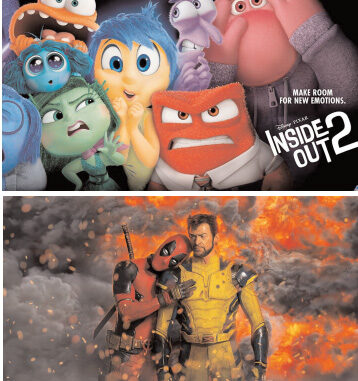
There were plenty of things that went wrong for Hollywood in the year 2024. There were box office flops (sorry, “Joker: Folie à Deux” and “Kraven the Hunter”), mass layoffs, continued labor unrest and a stunning lack of employment in the production space due to a broad contraction in the media and entertainment sector.
But not everything, or everyone, failed.
Disney gets its mojo back
Bob Iger came into 2024 with a challenging hand — a low stock price, a money-losing streaming business, a renewed proxy campaign from a prominent investor and a movie slate with only one Marvel Studios film. But while Disney is not fully in the clear yet, the company has emerged much stronger than many people expected.
Iger decisively beat the onslaught from Nelson Peltz and his hard-charging allies. The movie studio, which had a wobbly track record during the post-pandemic years, scored two $1-billion hits — “Inside Out 2” and “Deadpool and Wolverine” — and other big performers including “Moana 2” and “Alien: Romulus.” The stock is up more than 25% since the beginning of the year. Cable programmer and Hulu supplier FX dominated the TV awards season with “Shogun” and “The Bear.” And those streaming services? They’ve started turning quarterly profits, when all put together.
Yeah, sure, you might say. But serious questions remain in Disney’s comeback story. For example, how will ESPN’s upcoming flagship streaming service fare when it launches next year?
And here’s the big one: Who’s going to replace Iger when he steps down for good this time? Will it be one of the four division heads: TV chair Dana Walden, parks boss Josh D’Amaro, ESPN head Jimmy Pitaro or film czar Alan Bergman? Or an outsider? With James P. Gorman (Morgan Stanley‘s outgoing executive chairman) leading the succession process, Disney is hoping this transfer of power is less dramatic than previous rounds.
We’ll see in due time, as the company has set early 2026 as its target for making its selection.
David Ellison conquers the mountain
The deal almost fell apart, but after so much wrangling, Paramount Global will soon have a new chief: David Ellison, the son of Oracle Corp. billionaire Larry Ellison.
The task of fixing all that broke at Paramount under the Redstone family won’t be easy. Years of chronic under-investment won’t be overcome immediately, no matter how much techno know-how Ellison and his team bring to the famed Paramount movie studio, CBS, a second-tier streaming service and a collection of faltering cable networks. Cost cutting has already come and discussions about restructuring and leadership changes are underway.
Paramount has franchises like “Sonic the Hedgehog,” “Top Gun” and the Taylor Sheridan universe, but it needs more, and it needs to do more with what it has, according to Ellison and his private equity backers at RedBird. Easier said than done. But the industry is ready to give Ellison a chance. After all, he’s a movie guy.
This clearly won’t be the last of the big studio deals. Analysts expect more consolidation as cable channels continue to lose power, especially with the Trump administration anticipated to be more favorable to mergers and acquisitions than the Biden White House.
The movie musical makes a comeback
No one mourns the wicked, and no one should fear the movie musical. Universal Pictures and Jon M. Chu’s big-screen rendering of the Broadway smash “Wicked” has made hundreds of millions of dollars at the box office (mostly in the U.S.) and instantly catapulted Ariana Grande and Cynthia Erivo into the Oscar race. “Part Two,” now titled “Wicked: For Good,” comes out next year.
The movie musical is a tradition as old as Hollywood itself, but the genre had come on hard times in recent years, thanks to flops such as “Cats,” “Dear Evan Hansen” and “The Color Purple.” Despite the success of movies such as “Wonka” and “The Greatest Showman,” studios seemed nervous to advertise the musical elements of their song-and-dance extravaganzas. Well, no need this time. If anyone went into “Wicked” not knowing it was a musical, that’s on them.
Studios should know musicals aren’t a turn-off for audiences, especially if fans are already obsessed with the soundtrack. That level of familiarity is what helped propel the record-breaking box office opening weekend of “Moana 2.” (Animation has been a true bright spot for the movie business, with the “Inside Out” sequel, “Despicable Me 4” and “The Wild Robot”).
Funnily enough, “Wicked” isn’t the only musical in the awards conversation. Netflix’s big contender is the operatic “Emilia Pérez,” a boundary-pushing festival darling that received mostly positive reviews but a tepid response from streaming audiences.
Podcasters shake up news media
Politicians doing podcast interviews and nonpolitical media appearances is not a new phenomenon. The latter is a tradition going back to Richard Nixon going on “Laugh-In” and Bill Clinton playing the sax on “The Arsenio Hall Show.”
But for President-elect Donald Trump’s campaign, sitting for long, friendly podcast interviews wasn’t just part of the Republican presidential candidate’s media strategy. It was the strategy. Trump talked at length to Joe Rogan, Theo Von and the “Flagrant” guys Andrew Schulz and Akaash Singh, all to target their loyal audience of young men. Trump did this while avoiding traditional outlets like “60 Minutes,” which he sued over how it edited its interview with his opponent.
Vice President Kamala Harris’ failed campaign also used podcasts like Alex Cooper’s “Call Her Daddy,” while still doing more standard TV appearances. Hindsight suggests her interview on “The View,” in which she couldn’t say what she would’ve done differently from President Biden, might’ve done more harm than good.
The biggest takeaway? The declining relevance of legacy news media as a force that can shape public opinion — a consequence of declining viewership and historically low trust in mainstream institutions.





Be the first to comment